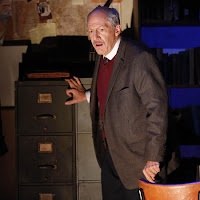When
Simon Wiesenthal retired, Alois Brunner was the high-ranking National Socialist
war criminal on his most-wanted list still at-large. We can thank the Assad
regime for sheltering him in Syria. Yet, even on his last day working at the Jewish
Historical Documentation Center in Austria, Wiesenthal kept following up leads.
He will also host a group of visitors who have come hoping to gain some insight
on the horrific events he witnessed and helped prosecute. That would be us, the
audience of Tom Dugan’s one-man show Wiesenthal,
recorded live in performance at the Acorn Theatre on Theatre Row, which airs as
part of the current season of Theater Close-Up on New York’s Thirteen.
With
his wife Cyla waiting for him at home, Wiesenthal promises to revisit his “greatest
hits” and then ask us, presumably a group of fresh faced students or the like,
the question he nearly forgot to ask. It is 2003, but the Linz office looks
unchanged since the 1970s, with its rotary phone and battered filing cabinets. By
this point, Wiesenthal has outlived most of his prey, but he is still trying to
get someone in the Damascus Meridian Hotel to confirm Brunner’s presence in
writing.
Wiesenthal’s
career highlights are indeed significant. Aside from contributing behind-the-scenes
to the Mossad’s celebrated capture of Adolph Eichmann, Wiesenthal also revisits
his pursuit of Franz Stangel, the commandant of Treblinka and Karl Silberbauer,
the SS officer who arrested Anne Frank and her family. He also looks back
ruefully on the unsuccessful prosecution of Franz Murer, “the Butcher from
Vilnius.” Frankly, those exploits ought to be much more widely known. Yet, what
many average media consumers know about Wiesenthal, if anything, probably
starts with Eichmann and ends with his frustrated search for Mengele.
Fittingly,
there is a sunflower amongst the clutter of Wiesenthal’s impressively designed
office. Although his controversial short story is never directly addressed,
there is a bit of poetry to Dugan’s text. Indeed, that final question is genuinely
moving, in a suitably quiet and reflective way, thanks to the early groundwork
he lays down. It is also ties back in with the evil Alois Brunner rather
adroitly. As Wiesenthal, Dugan makes an engaging raconteur, as well as a
haunted witness to some of the worst atrocities imaginable. It is a
down-to-earth portrayal that doggedly humanizes the Nazi-hunter rather than
elevating him on a pedestal.
There
was a time when filmed theatrical productions were a staple of pay cable programming,
around the time Gallagher was smashing melons with the Sledge-O-Matic. It is
nice to see Thirteen bring the stage back to television. Despite a bit of
fourth wall-breaking here and there, Wiesenthal
transfers quite easily to the small screen. Smart and poignant without ever
getting heavy-handed or lectury, Dugan’s Wiesenthal
is definitely recommended when it premieres this Thursday (11/12) on WNET
Thirteen.
(Photos:
Carol Rosegg)

